
Nourish your skin naturally
with timeless remedies and simple rituals
Your skin is a reflection of your story, your care, and your connection to the world around you. It deserves kindness, nourishment, and the simple power of nature. At this very moment, you have everything you need to glow—not from products alone, but from mindful care, pure ingredients, and the time you dedicate to yourself.
Skincare isn’t just about appearances; it’s an act of love, a daily ritual to honor the strength and beauty that is uniquely yours. Let each touch, mask, and moment remind you that radiance begins within.
Explore the gentle magic of natural remedies and discover how the simplest routines can bring out your skin's most vibrant glow. Let nature guide you to the beauty that’s always been there.
The Best Oils for Skincare // Nature’s Gift to Radiant Skin
Discover the transformative power of natural oils for skincare. Used for centuries across cultures, oils like jojoba, argan, and rosehip are rich in nutrients that hydrate, heal, and rejuvenate the skin. Learn about the history of oils in skincare, their six incredible health benefits, and the best oils for radiant skin. From reducing scars to balancing oil production, these oils are the key to achieving a glowing, healthy complexion. Explore how to incorporate them into your routine for soft, nourished skin.
Oils have been a cornerstone of beauty rituals for centuries, offering nourishment, hydration, and protection for the skin. From ancient civilizations to modern skincare, their use transcends time and cultures. With their unique ability to balance and replenish the skin, oils are a natural, effective way to achieve a healthy, glowing complexion.
Let’s explore the history of using oils for skincare, their incredible benefits, and the top oils you should incorporate into your routine for radiant, healthy skin.
The History of Using Oils for Skincare
The use of oils for skincare dates back thousands of years, deeply rooted in cultural traditions across the globe.
Ancient Egypt
Oils like moringa and castor oil were prized for their anti-aging properties. Cleopatra was said to use almond oil and olive oil in her beauty rituals to keep her skin soft and youthful.Ancient Greece and Rome
Olive oil was a staple in Greek and Roman beauty routines, used as a cleanser, moisturizer, and even sunscreen.India and Ayurveda
Ayurvedic practices emphasized the use of sesame oil and coconut oil for skin hydration and detoxification. These oils were often infused with herbs to enhance their benefits.Traditional Chinese Medicine
Oils like camellia and sesame were used to balance the skin’s energy and provide deep nourishment.Middle Eastern Traditions
Argan oil, often called “liquid gold,” was used by Berber women in Morocco for its hydrating and healing properties.
These ancient practices remind us of the enduring power of oils as nature’s simplest and most effective skincare remedy.
Health Benefits of Using Oils on Skin
Deep Hydration
Oils penetrate deeply into the skin, locking in moisture and preventing dryness.Restores Skin Barrier
They strengthen the skin’s natural barrier, protecting against environmental damage and moisture loss.Rich in Antioxidants
Oils are packed with vitamins and antioxidants that fight free radicals, preventing premature aging.Soothes Irritation
Many oils have anti-inflammatory properties that calm redness, itching, and irritation.Regulates Oil Production
Contrary to belief, oils can balance the skin’s natural sebum production, making them ideal even for oily skin.Promotes Healing
Oils help repair damaged skin, fade scars, and reduce the appearance of blemishes.
The Best Oils for Skincare
1. Jojoba Oil
About Jojoba Oil:
Extracted from the seeds of the jojoba plant, this oil closely mimics the skin’s natural sebum, making it a favorite for all skin types. It is lightweight, non-greasy, and absorbs quickly into the skin.
Health Benefits:
Balances sebum production, preventing excess oiliness or dryness.
Moisturizes deeply without clogging pores.
Soothes inflamed skin, making it ideal for acne and eczema.
Rich in vitamin E, it protects against free radicals.
Promotes wound healing and reduces the appearance of scars.
Enhances skin elasticity, keeping it firm and youthful.
2. Argan Oil
About Argan Oil:
Often called "liquid gold," argan oil comes from the kernels of the argan tree in Morocco. It’s rich in essential fatty acids, antioxidants, and vitamin E.
Health Benefits:
Hydrates and softens dry, flaky skin.
Reduces inflammation, soothing redness and irritation.
Protects against environmental damage like pollution and UV rays.
Improves skin elasticity and reduces the appearance of fine lines.
Balances oily skin by regulating sebum production.
Helps fade acne scars and stretch marks.
3. Rosehip Oil
About Rosehip Oil:
Extracted from the seeds of wild rose bushes, rosehip oil is renowned for its regenerative properties. It’s rich in vitamins A and C, essential fatty acids, and antioxidants.
Health Benefits:
Brightens the skin and fades dark spots and pigmentation.
Boosts collagen production for firmer, plumper skin.
Reduces the appearance of fine lines and wrinkles.
Hydrates deeply, leaving the skin soft and supple.
Soothes irritated skin, making it suitable for sensitive skin types.
Helps repair damaged skin and reduces scars.
4. Coconut Oil
About Coconut Oil:
A versatile oil used for centuries, coconut oil is extracted from the meat of coconuts. Its antibacterial and moisturizing properties make it a staple in skincare routines.
Health Benefits:
Hydrates and softens the skin, preventing dryness.
Acts as a natural antibacterial, combating acne-causing bacteria.
Protects the skin barrier, reducing moisture loss.
Reduces inflammation and soothes irritated skin.
Improves skin texture, leaving it smooth and glowing.
Works as a natural makeup remover without stripping the skin.
5. Sweet Almond Oil
About Sweet Almond Oil:
Derived from almonds, this lightweight oil is packed with vitamins A, E, and fatty acids. It’s gentle and perfect for sensitive skin.
Health Benefits:
Moisturizes deeply, leaving the skin soft and smooth.
Reduces dark circles and puffiness around the eyes.
Protects against UV damage with its antioxidant content.
Helps fade scars and stretch marks over time.
Soothes irritated skin, including conditions like eczema and psoriasis.
Improves skin tone and texture, creating a radiant complexion.
6. Tea Tree Oil
About Tea Tree Oil:
Extracted from the leaves of the tea tree, this oil is renowned for its antimicrobial properties. It’s a powerful remedy for acne and blemish-prone skin.
Health Benefits:
Fights acne by killing bacteria and reducing inflammation.
Soothes redness and irritation caused by breakouts.
Balances oily skin by regulating sebum production.
Helps unclog pores, preventing blackheads and whiteheads.
Speeds up the healing of cuts, wounds, and acne scars.
Acts as a natural toner, tightening pores and improving skin texture.
Incorporating Oils into Your Skincare Routine
As a Moisturizer: Apply a few drops of your chosen oil after cleansing to lock in hydration.
As a Serum: Use oils like rosehip or jojoba before your moisturizer for targeted benefits.
For Massage: Use oils like almond or coconut for a relaxing facial massage.
In DIY Masks: Mix oils with honey, yogurt, or aloe vera for a nourishing mask.
Oils are more than just skincare ingredients—they’re a connection to ancient traditions and a reminder of the power of nature. With their ability to hydrate, heal, and protect, oils offer a luxurious, effective solution for radiant skin. Embrace these natural elixirs in your skincare routine and let their timeless benefits transform your skin into its healthiest, most glowing state.
Honey and Lemon Mask for Radiant Skin
Discover the natural power of honey and lemon for radiant, glowing skin. This simple mask combines the moisturizing and healing properties of honey with the brightening and cleansing benefits of lemon. Learn about the history behind these timeless ingredients, their unique benefits for your skin, and how to create an easy honey and lemon mask at home. With tips, detailed recipes, and alternative uses, this mask is perfect for hydrating, exfoliating, and refreshing your skin with minimal effort.
Honey and lemon, two of nature’s most potent and versatile ingredients, come together in a simple yet highly effective mask that transforms your skin. Both have been used for centuries in traditional beauty and wellness rituals, celebrated for their ability to cleanse, hydrate, and rejuvenate. This mask is a testament to the power of simplicity, combining just two ingredients to create a glowing, radiant complexion.
A Brief History of Honey and Lemon in Beauty
Honey has been a staple in beauty rituals for thousands of years. The ancient Egyptians, including Cleopatra, cherished honey for its moisturizing and healing properties. Honey was used in masks, baths, and ointments to keep the skin soft, youthful, and glowing. Its antibacterial properties also made it invaluable for wound care and treating skin blemishes.
Lemon, on the other hand, was prized in ancient Rome and the Middle East for its cleansing and brightening properties. Roman women often used lemon juice to lighten their skin and reduce the appearance of blemishes. Its high vitamin C content and refreshing scent made it a favorite ingredient in both skincare and perfumery.
Together, honey and lemon form a powerful duo that has stood the test of time, offering natural solutions for a variety of skin concerns.
Health Benefits of Honey and Lemon for Skin
Benefits of Honey
Deeply Moisturizes: Honey is a natural humectant, meaning it draws moisture from the air into your skin, keeping it hydrated and soft.
Heals and Soothes: Its antibacterial and anti-inflammatory properties help soothe irritated skin and heal acne and minor wounds.
Natural Exfoliation: Honey contains gentle enzymes that exfoliate dead skin cells, revealing a fresh, radiant layer beneath.
Fights Acne: With its antimicrobial properties, honey combats acne-causing bacteria while calming redness and inflammation.
Anti-Aging Properties: Packed with antioxidants, honey helps fight free radicals, reducing fine lines and wrinkles.
Benefits of Lemon
Brightens Skin: Lemon is rich in vitamin C, which helps lighten dark spots, even out skin tone, and promote a radiant glow.
Cleanses and Detoxifies: Its natural astringent properties cleanse pores and reduce oiliness, preventing breakouts.
Exfoliates Dead Skin: The citric acid in lemon acts as a natural exfoliant, removing dead skin cells and promoting cell turnover.
Reduces Blackheads: Lemon’s antibacterial properties help unclog pores, reducing blackheads and whiteheads.
Promotes Collagen Production: Vitamin C in lemon boosts collagen synthesis, improving skin elasticity and firmness.
Detailed Benefits
1. Honey: Deep Moisturization and Healing
Honey’s humectant properties not only lock in moisture but also prevent the skin from drying out. This makes it ideal for all skin types, especially dry and sensitive skin. Its natural sugars soothe the skin, while enzymes gently exfoliate, leaving it soft and refreshed.
Honey’s antibacterial properties make it a great ally for acne-prone skin. It reduces redness, calms irritation, and speeds up the healing of blemishes. Its antioxidants fight free radicals, promoting a youthful glow and reducing the appearance of wrinkles.
2. Lemon: Brightening and Detoxifying
Lemon’s vitamin C content is a game-changer for dull, uneven skin. It fades dark spots and hyperpigmentation, creating a more balanced and radiant complexion. Its astringent properties tighten pores, reduce excess oil, and cleanse deeply, leaving your skin feeling refreshed.
The citric acid in lemon gently exfoliates dead skin cells, revealing smoother, brighter skin. It also boosts collagen production, essential for maintaining skin elasticity and reducing signs of aging.
Honey and Lemon Mask Recipe
Ingredients:
1 tablespoon raw honey
1 teaspoon freshly squeezed lemon juice
Instructions:
In a small bowl, mix the honey and lemon juice until well combined.
Apply the mixture evenly to clean, dry skin, avoiding the eye area.
Leave the mask on for 15–20 minutes.
Rinse with lukewarm water and gently pat your skin dry with a clean towel.
Follow up with your favorite moisturizer to lock in hydration.
Tips for Using Honey and Lemon Mask
Patch Test First: Lemon can be strong for sensitive skin. Always do a patch test on your wrist or jawline before applying it to your face.
Use Fresh Lemon Juice: Always use freshly squeezed lemon juice for maximum benefits and to avoid preservatives found in bottled versions.
Time It Right: Apply the mask in the evening to avoid sun sensitivity caused by lemon.
Frequency: Use the mask once or twice a week for best results. Overuse may dry out your skin due to the acidity of lemon.
Store Honey Properly: Keep your honey in a cool, dry place to preserve its natural enzymes and nutrients.
Alternative Honey and Lemon Recipes
1. Honey, Lemon, and Yogurt Brightening Mask
Add yogurt for extra hydration and gentle exfoliation.
Ingredients:
1 tablespoon honey
1 teaspoon lemon juice
1 tablespoon plain yogurt
Instructions:
Mix all ingredients into a smooth paste.
Apply to your face and leave it on for 15 minutes.
Rinse with lukewarm water for soft, glowing skin.
2. Honey, Lemon, and Turmeric Spot Treatment
Turmeric’s anti-inflammatory properties make this ideal for acne-prone skin.
Ingredients:
1 tablespoon honey
1 teaspoon lemon juice
A pinch of turmeric
Instructions:
Mix the ingredients into a thick paste.
Apply to blemishes or dark spots.
Leave it on for 10 minutes, then rinse with water.
3. Honey and Lemon Scrub for Exfoliation
Add sugar for a gentle exfoliating scrub.
Ingredients:
1 tablespoon honey
1 teaspoon lemon juice
1 tablespoon sugar
Instructions:
Mix the ingredients into a gritty paste.
Gently massage onto damp skin in circular motions for 2–3 minutes.
Rinse with warm water to reveal smooth, polished skin.
The Beauty of Simplicity
Honey and lemon are a perfect pairing for radiant skin, combining hydration, brightening, and cleansing into one powerful mask. Their timeless appeal and effectiveness remind us that natural beauty begins with simple, pure ingredients. By incorporating these natural remedies into your skincare routine, you’re not just treating your skin—you’re embracing a holistic, nurturing approach to self-care. Let the magic of honey and lemon leave your skin glowing, refreshed, and truly radiant.
The Benefits of Rosewater for Skin
Rosewater, a fragrant and versatile skincare staple, has been cherished for centuries for its soothing, hydrating, and balancing properties. From ancient Persian beauty rituals to Cleopatra’s timeless skincare routine, rosewater has been used to enhance natural beauty. Its benefits include reducing redness, fighting acne, minimizing pores, and providing powerful antioxidant protection. Learn about its fascinating history, health benefits for skin, and simple ways to make and use rosewater at home. With easy DIY recipes for toners, mists, and masks, rosewater is the perfect natural addition to your self-care routine.
Rosewater, a fragrant and gentle distillation of rose petals, is one of nature’s most beloved elixirs for beauty and skincare. Known for its soothing, hydrating, and balancing properties, rosewater has been a staple in skincare routines across cultures for centuries. This delicate yet powerful ingredient not only refreshes the skin but also brings a touch of timeless elegance to your self-care rituals.
The History of Rosewater
The history of rosewater is as enchanting as its scent. Its origins can be traced back to ancient Persia, where it was first distilled as a luxurious perfume and skincare ingredient. The Persian empire was renowned for its gardens of fragrant roses, and the process of extracting rosewater became an art form.
In ancient Egypt, Cleopatra, a beauty icon for the ages, was said to have used rosewater in her skincare routine. She valued its ability to hydrate and soften her skin, incorporating it into her daily rituals to maintain her legendary beauty.
During the medieval period, rosewater found its way to Europe and the Middle East, where it became a symbol of luxury and refinement. In the Middle East, rosewater was used not only for its aroma but also for its cooling and anti-inflammatory properties, ideal for the region’s hot climate.
In India, rosewater was, and still is, a vital part of Ayurvedic medicine and beauty. Known as "gulab jal," it has been used to cleanse and balance the skin while offering a soothing effect on the mind. Even today, rosewater holds a revered place in Indian bridal rituals, symbolizing purity and beauty.
Health Benefits of Rosewater for Skin
Rosewater offers an array of benefits for the skin, making it a versatile and effective natural remedy. Here’s how it works wonders:
Hydrates and refreshes the skin.
Balances the skin’s pH levels.
Soothes irritation and redness.
Fights acne and reduces inflammation.
Minimizes pores and tightens the skin.
Protects against environmental damage.
Reduces the appearance of fine lines and wrinkles.
Let’s explore these benefits in detail.
Detailed Benefits of Rosewater for Skin
Hydrates and Refreshes the Skin
Rosewater is a natural humectant, which means it helps the skin retain moisture. Its light, non-greasy texture makes it perfect for providing instant hydration, leaving the skin feeling refreshed and rejuvenated.Balances the Skin’s pH Levels
Rosewater has a natural pH of around 5.5, which is similar to the skin’s pH. This makes it ideal for restoring balance to the skin, especially if it has been disrupted by harsh cleansers or environmental factors.Soothes Irritation and Redness
The anti-inflammatory properties of rosewater make it a gentle solution for calming irritated or sensitive skin. It’s particularly effective for conditions like eczema, rosacea, and sunburn, providing instant relief.Fights Acne and Reduces Inflammation
Rosewater’s antibacterial properties help combat acne-causing bacteria, while its soothing nature reduces the redness and swelling associated with breakouts.Minimizes Pores and Tightens the Skin
Using rosewater as a toner helps tighten the skin and minimize the appearance of pores. It gives the skin a smoother texture and prepares it for further skincare steps.Protects Against Environmental Damage
Rich in antioxidants, rosewater helps neutralize free radicals caused by pollution and UV rays, protecting the skin from premature aging and damage.Reduces the Appearance of Fine Lines and Wrinkles
With regular use, rosewater can improve skin elasticity and reduce the visibility of fine lines, thanks to its hydrating and antioxidant properties.
How to Make Rosewater at Home
Making rosewater at home is easy and ensures that you have a pure, chemical-free product. Here’s a simple method to create your own rosewater:
Ingredients:
1 cup fresh rose petals (organic and pesticide-free)
2 cups distilled water
Instructions:
Rinse the rose petals to remove any dirt.
Place the petals in a large pot and pour the distilled water over them.
Cover the pot with a lid and simmer on low heat for 30–40 minutes.
Allow the mixture to cool, then strain the liquid into a clean glass jar or bottle.
Store your homemade rosewater in the refrigerator for up to two weeks.
Three Ways to Use Rosewater for Skin
Rosewater is incredibly versatile and can be used in various ways to enhance your skincare routine. Here are three effective recipes:
1. Rosewater Toner
A simple rosewater toner helps balance your skin and prepare it for moisturization.
How to Use:
Pour rosewater into a spray bottle.
Spritz it directly onto your face after cleansing or apply with a cotton pad.
Follow with your favorite moisturizer.
Tip: Add a few drops of witch hazel for an added pore-tightening effect.
2. Rosewater and Aloe Vera Soothing Mist
This mist is perfect for calming irritated skin and adding a refreshing glow.
Ingredients:
1/2 cup rosewater
2 tablespoons aloe vera gel
5 drops lavender essential oil
How to Use:
Mix all ingredients in a spray bottle.
Shake well and spray onto your face throughout the day for a burst of hydration.
Tip: Keep the mist in the fridge for a cooling effect.
3. Rosewater and Honey Hydrating Mask
This mask deeply moisturizes the skin while enhancing its glow.
Ingredients:
2 tablespoons rosewater
1 tablespoon raw honey
How to Use:
Mix the rosewater and honey until well combined.
Apply evenly to clean skin and leave on for 15 minutes.
Rinse with lukewarm water and pat dry.
Tip: Use this mask once a week for best results.
The Timeless Beauty of Rosewater
Rosewater is more than a skincare ingredient; it’s a connection to centuries of beauty traditions and self-care rituals. Its gentle yet effective nature makes it suitable for all skin types, offering hydration, balance, and protection. Whether you make your own rosewater or incorporate it into masks and mists, this versatile ingredient is a must-have for glowing, healthy skin. Let the magic of roses infuse your routine with their timeless elegance and natural goodness.
How to Make a Turmeric Face Mask at Home
Turmeric has been a beauty secret for centuries, cherished in ancient Ayurvedic and Chinese traditions for its incredible skin benefits. This vibrant golden spice brightens, soothes, and nourishes the skin, making it perfect for DIY face masks. Whether you want to fight acne, reduce redness, or achieve a radiant glow, turmeric is a natural solution. Discover its fascinating history, the benefits it offers for skin health, and simple recipes to create masks at home using ingredients like honey, yogurt, coconut oil, and aloe vera. Embrace the timeless magic of turmeric for glowing, healthy skin.
Turmeric, a golden-yellow spice derived from the root of the Curcuma longa plant, has been treasured for centuries for its medicinal and beauty-enhancing properties. With its vibrant color and potent health benefits, turmeric has become a key ingredient in natural skincare routines worldwide. Known as the "golden goddess" of skincare, turmeric offers an array of benefits that leave the skin radiant and healthy.
The Fascinating History of Turmeric in Skincare
Turmeric has a long and illustrious history. Originating in South Asia, it has been used in Ayurvedic medicine and traditional beauty rituals for over 4,000 years. In India, turmeric was—and still is—an essential part of bridal skincare rituals. Brides apply a turmeric paste to their skin in the days leading up to the wedding to enhance their glow and purify the skin.
In ancient China, turmeric was valued for its anti-inflammatory and healing properties. Women used it to soothe their skin and treat blemishes. Even in the Middle East, turmeric was incorporated into skincare recipes for its ability to even out skin tone and enhance radiance.
Today, turmeric is celebrated globally as a natural ingredient for clear, glowing skin, with scientific research backing its effectiveness.
Health Benefits of Turmeric for Skin
Turmeric is packed with powerful compounds that work wonders for the skin. Here are some of its incredible benefits:
Reduces inflammation and redness.
Fights acne-causing bacteria.
Brightens and evens out skin tone.
Soothes dry or irritated skin.
Diminishes the appearance of scars and blemishes.
Protects against environmental damage.
Let’s explore these benefits in detail.
Detailed Benefits of Turmeric for Skin
Reduces Inflammation and Redness
Curcumin, the active compound in turmeric, is a natural anti-inflammatory. It calms redness and irritation, making it ideal for conditions like eczema, rosacea, or sunburn.Fights Acne-Causing Bacteria
Turmeric has antimicrobial properties that help combat the bacteria responsible for acne. It also reduces excess oil production, keeping pores clear.Brightens and Evens Out Skin Tone
Turmeric is a natural skin brightener. It reduces dark spots, pigmentation, and dullness, leaving the skin with a radiant glow.Soothes Dry or Irritated Skin
The moisturizing properties of turmeric combined with its anti-inflammatory benefits make it perfect for soothing dry or flaky skin.Diminishes Scars and Blemishes
Regular use of turmeric can lighten scars and blemishes. Its healing properties accelerate the regeneration of skin cells.Protects Against Environmental Damage
Turmeric is rich in antioxidants that fight free radicals, protecting the skin from pollution, UV rays, and other environmental stressors.
How to Use Turmeric for Skin Care
Turmeric can be used in various ways to create nourishing and effective face masks. Paired with other natural ingredients, it can address different skin concerns. Here are some easy and effective ways to use turmeric in your skincare routine:
1. Turmeric, Honey, and Coconut Oil Mask
This mask hydrates, soothes, and brightens the skin, making it perfect for dry or dull skin.
Ingredients:
1 teaspoon turmeric powder
1 tablespoon honey
1 teaspoon coconut oil
How to Use:
Mix all ingredients into a smooth paste.
Apply a thin layer to clean, dry skin.
Leave it on for 15–20 minutes, then rinse with lukewarm water.
Tip: Use this mask once a week for glowing, hydrated skin.
2. Turmeric and Yogurt Mask for Acne-Prone Skin
This mask is ideal for fighting acne and soothing inflammation.
Ingredients:
1 teaspoon turmeric powder
2 tablespoons plain yogurt
1 teaspoon lemon juice (optional for oily skin)
How to Use:
Combine all ingredients into a smooth mixture.
Apply to your face, focusing on acne-prone areas.
Leave it on for 10–15 minutes before rinsing.
Tip: The probiotics in yogurt enhance skin health, while turmeric reduces redness and bacteria.
3. Turmeric and Aloe Vera Soothing Mask
Perfect for sensitive skin or sunburn, this mask provides cooling and calming effects.
Ingredients:
1 teaspoon turmeric powder
2 tablespoons fresh aloe vera gel
How to Use:
Mix the turmeric and aloe vera gel until well blended.
Gently apply to your skin and leave it on for 20 minutes.
Rinse off with cool water.
Tip: Store the leftover mixture in the fridge for added cooling relief.
4. Turmeric and Oatmeal Exfoliating Mask
This mask gently exfoliates dead skin cells while nourishing the skin.
Ingredients:
1 teaspoon turmeric powder
2 tablespoons ground oatmeal
1 tablespoon milk or water
How to Use:
Mix all ingredients into a thick paste.
Massage onto damp skin in circular motions.
Leave it on for 10 minutes, then rinse with lukewarm water.
Tip: This mask is perfect for weekly use to maintain smooth, soft skin.
5. Turmeric and Rosewater Glow Mask
This simple mask enhances your skin’s natural glow and tightens pores.
Ingredients:
1 teaspoon turmeric powder
2 tablespoons rosewater
How to Use:
Combine turmeric and rosewater into a smooth liquid paste.
Apply evenly to your skin using a cotton pad.
Leave it on for 15 minutes before rinsing with cool water.
Tip: Use this before special occasions for an instant glow.
The Joy of Turmeric in Your Routine
Turmeric is more than a spice—it’s a gift from nature that has stood the test of time. With its incredible skin benefits and versatility, turmeric is a simple yet powerful addition to any skincare routine. These masks are easy to prepare, require minimal ingredients, and deliver visible results. By embracing the magic of turmeric, you’ll not only enhance your skin’s health but also reconnect with ancient traditions that celebrate the beauty of simplicity. Let turmeric bring out the natural glow you deserve!















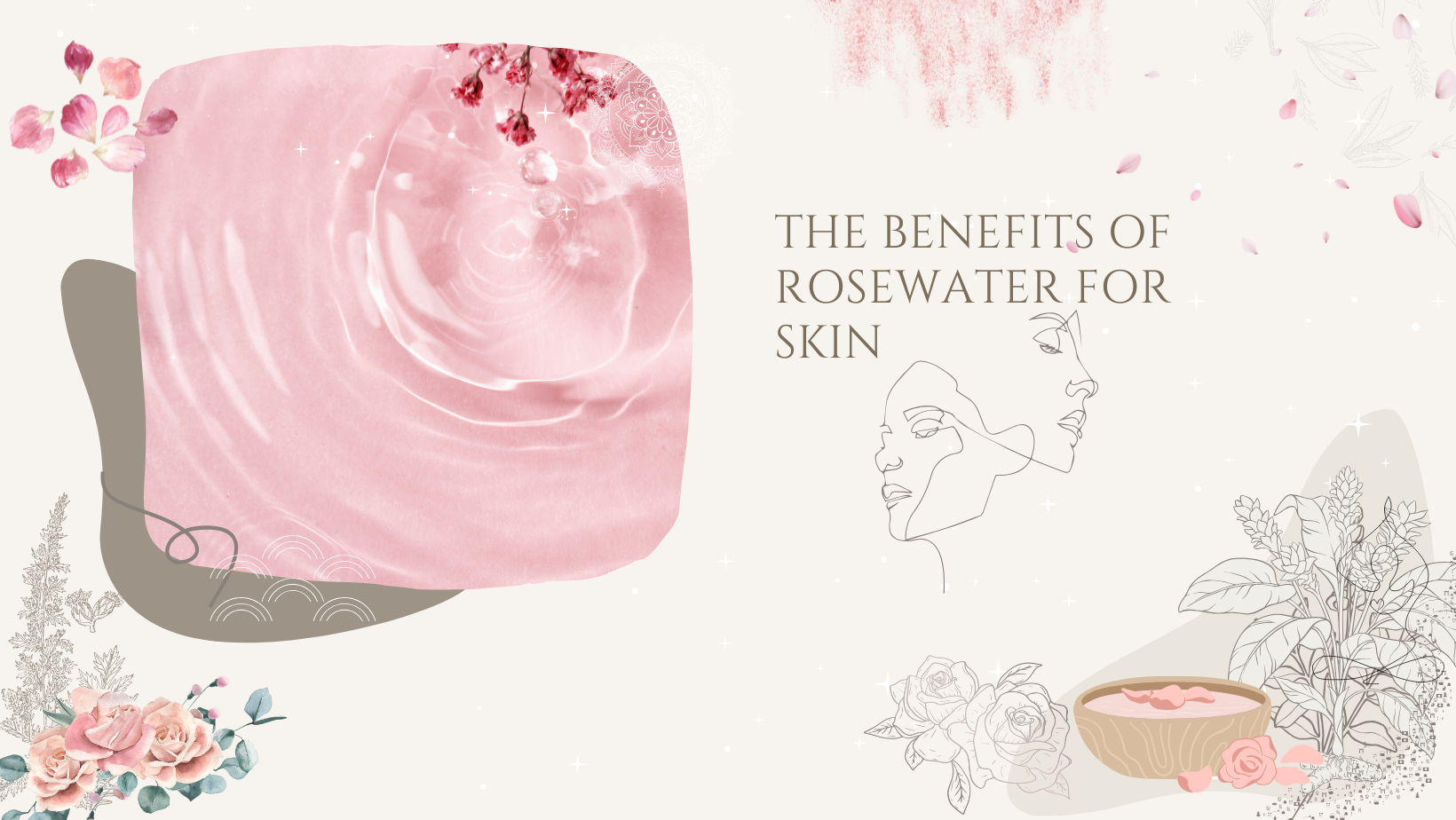

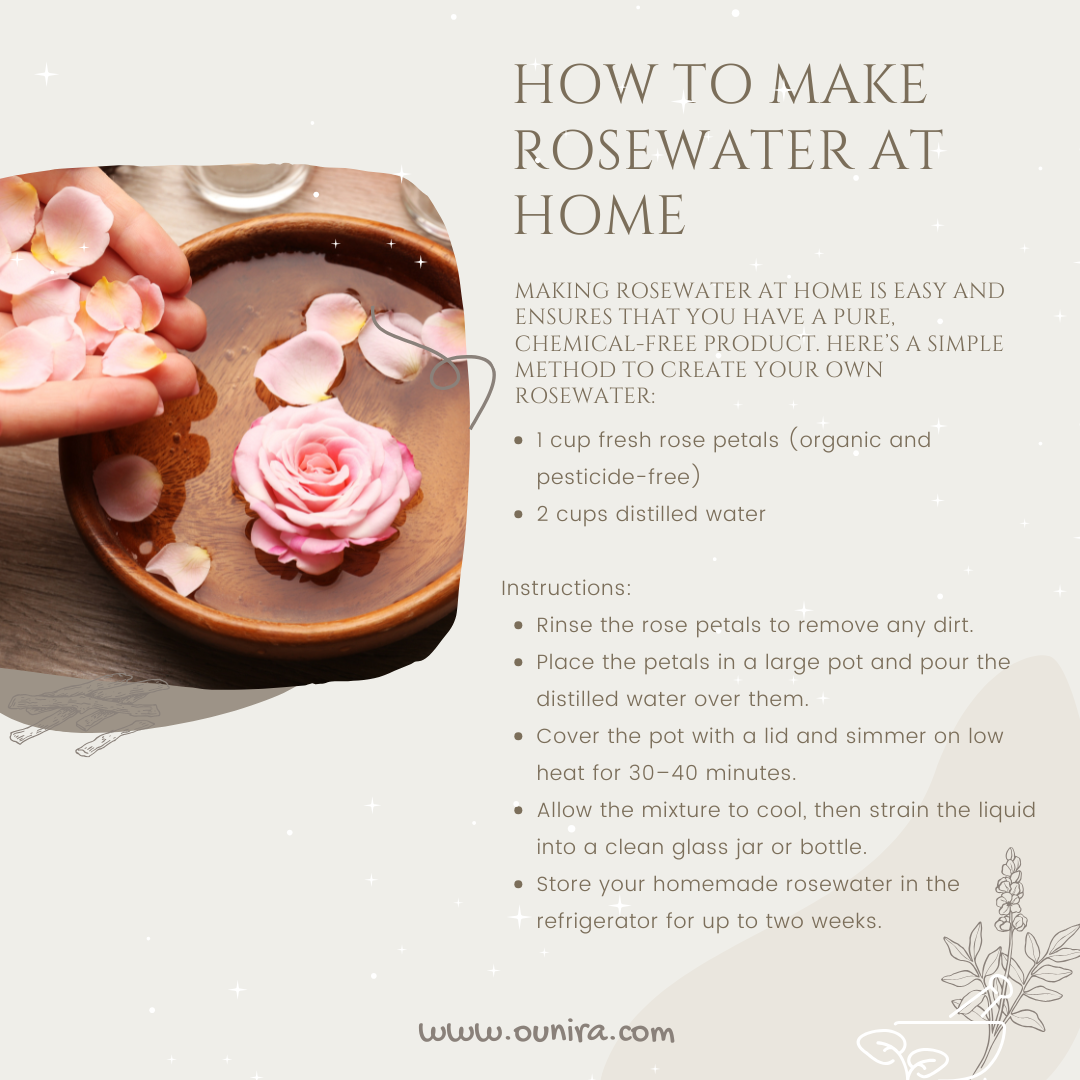



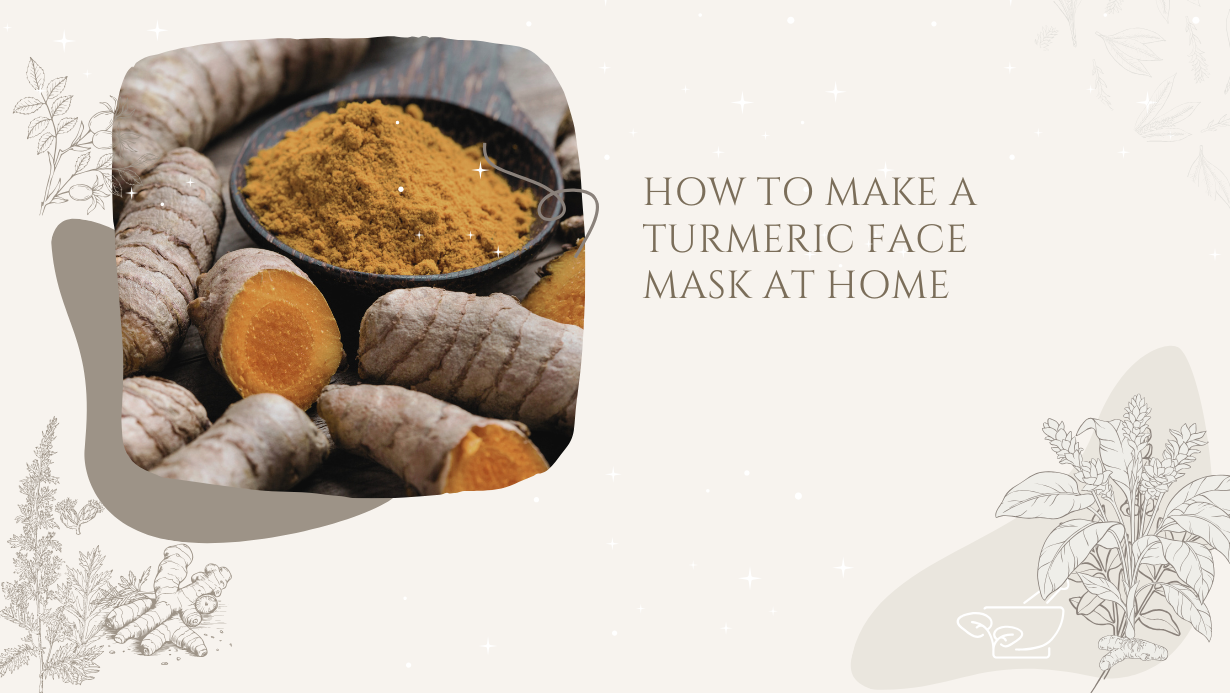



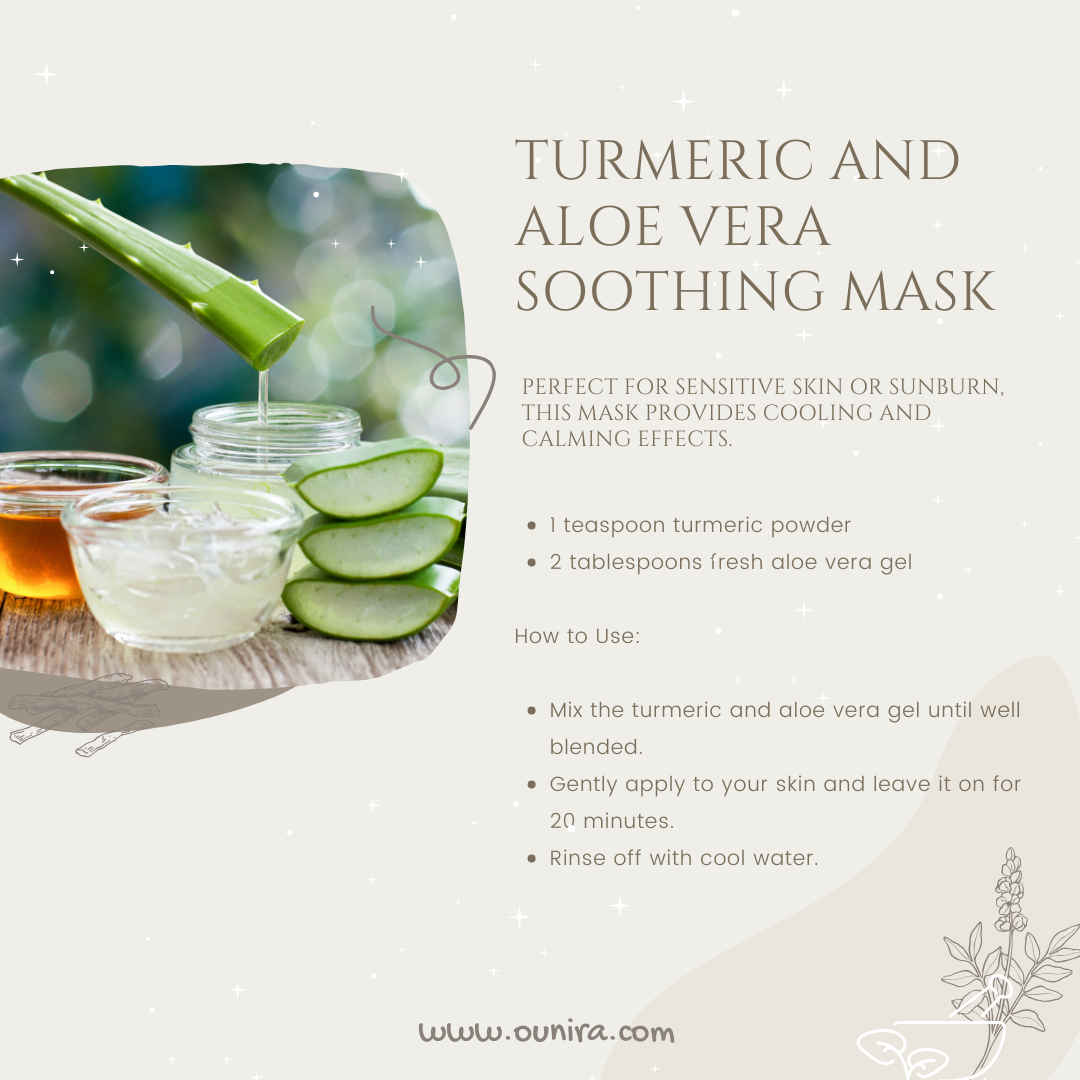
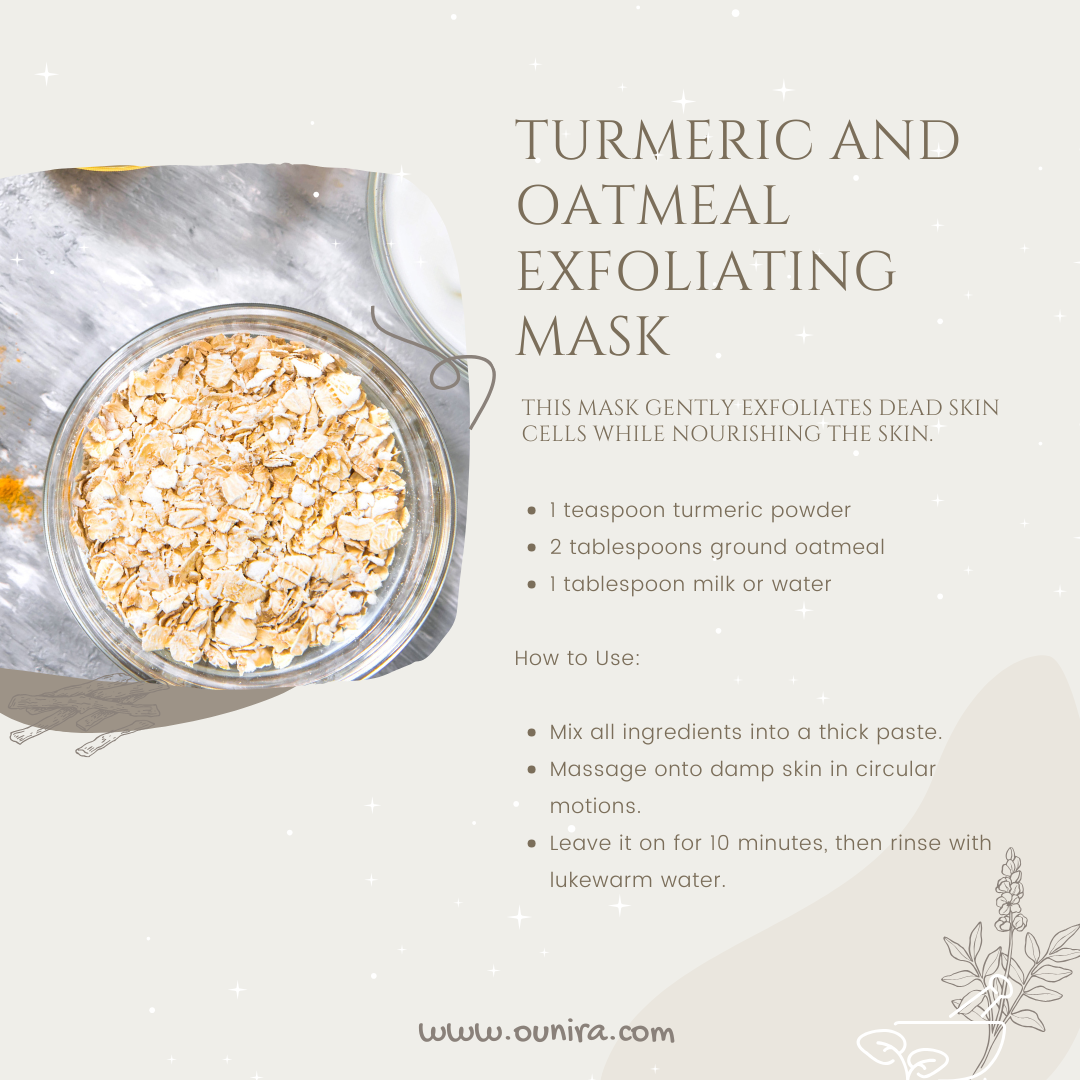






Discover the transformative power of nighttime rituals for restful sleep and radiant skin. Learn how mindful practices, calming teas like black sesame tea, and natural skincare routines can rejuvenate your mind, body, and skin. These rituals, including meditation, gratitude, and nourishing overnight masks, enhance sleep quality and promote skin repair, leaving you refreshed and glowing each morning.